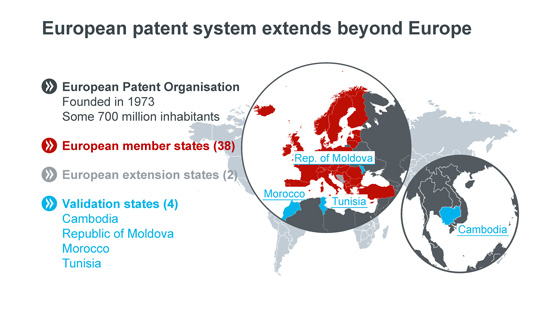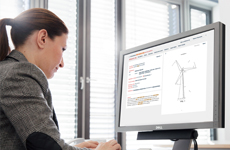In 2018 we worked closely with the national IP offices of our 38 member states to improve our services and make life easier for inventors and industry. This included raising awareness of patent protection in areas as diverse as artificial intelligence, the space industry and green technologies. We implemented a range of joint activities aimed at strengthening the European patent system, for example by increasing the number of qualified patent attorneys, training national patent office staff and exchanging high quality patent data. Thanks to these efforts, our free information tools - Espacenet and the Federated Register - now offer an instant overview of prior art and legal-status data from around Europe to everyone.
Bilateral co-operation with countries outside our organisation also intensified. In March 2018 a validation agreement with Cambodia came into force, making it the fourth country (after Morocco, Moldova and Tunisia) and the first Asian one to recognise European patents on its territory. As a result, European patents can now be granted for up to 44 countries on the basis of a single application, covering a market of some 700 million people.

 In June 2018 the EPO
broke new ground by signing its first "reinforced partnership" with the Companies and Intellectual Property Commission (CIPC) of South Africa, enabling us to co-operate on designing the
legal
framework to introduce substantive search and examination under the country's
national IP policy while also improving the patent grant process through
work-sharing. Under this new form of co-operation, partner countries outside
Europe can systematically re-use the search and examination results produced by
the EPO when granting national patents under their own legal framework. They
also receive advanced technical assistance. The aim is to build up the
country's capacity to provide efficient high-quality patent procedures, whilst
also serving European users and industry, who in future can expect to find
similar conditions to home when protecting their inventions in these markets.
In June 2018 the EPO
broke new ground by signing its first "reinforced partnership" with the Companies and Intellectual Property Commission (CIPC) of South Africa, enabling us to co-operate on designing the
legal
framework to introduce substantive search and examination under the country's
national IP policy while also improving the patent grant process through
work-sharing. Under this new form of co-operation, partner countries outside
Europe can systematically re-use the search and examination results produced by
the EPO when granting national patents under their own legal framework. They
also receive advanced technical assistance. The aim is to build up the
country's capacity to provide efficient high-quality patent procedures, whilst
also serving European users and industry, who in future can expect to find
similar conditions to home when protecting their inventions in these markets.
 Other forms of
technical co-operation are aligning patent systems worldwide: in 2018 we signed
agreements with the IP offices of Argentina, Australia, and Canada, which paved
the way for them to adopt the Cooperative Patent Classification, a joint scheme
developed by the EPO and USPTO and now used by 29 patent offices globally.
Sharing a common classification scheme facilitates access for the public and
experts to technical information contained in patent documents from around the
world, and also helps to improve the quality of the work carried out by patent
offices.
Other forms of
technical co-operation are aligning patent systems worldwide: in 2018 we signed
agreements with the IP offices of Argentina, Australia, and Canada, which paved
the way for them to adopt the Cooperative Patent Classification, a joint scheme
developed by the EPO and USPTO and now used by 29 patent offices globally.
Sharing a common classification scheme facilitates access for the public and
experts to technical information contained in patent documents from around the
world, and also helps to improve the quality of the work carried out by patent
offices.
Meanwhile, the Patent Prosecution Highway (PPH) programmes, which we are implementing with 15 partner offices worldwide so far, are becoming increasingly popular with patent applicants, as they can obtain patents more quickly and efficiently through fast-track procedures. By the end of 2018, the EPO had received more than 11 300 requests under the PPH, and the number of European users requesting PPH at the other offices using work products established by the EPO had reached 19 000.
 At multilateral
level, co-operation continued with our IP5 partners (the patent offices of
China, Japan, Republic of Korea and the US). Together we handle 85% of the
patent applications worldwide, and many of them are cross-filed at two or more
of our offices. In 2018 the IP5 identified artificial intelligence as a joint
priority and agreed to analyse its impact on the IP system, with a view to
exploring how we can align our policies and practices in this area. We also
continued to improve the services we offer under the Patent Cooperation
Treaty. In all these activities, the EPO
continued to seek feedback from industry associations and IP professionals to
ensure that our services are meeting users' needs - not only in Europe, but
around the globe.
At multilateral
level, co-operation continued with our IP5 partners (the patent offices of
China, Japan, Republic of Korea and the US). Together we handle 85% of the
patent applications worldwide, and many of them are cross-filed at two or more
of our offices. In 2018 the IP5 identified artificial intelligence as a joint
priority and agreed to analyse its impact on the IP system, with a view to
exploring how we can align our policies and practices in this area. We also
continued to improve the services we offer under the Patent Cooperation
Treaty. In all these activities, the EPO
continued to seek feedback from industry associations and IP professionals to
ensure that our services are meeting users' needs - not only in Europe, but
around the globe.